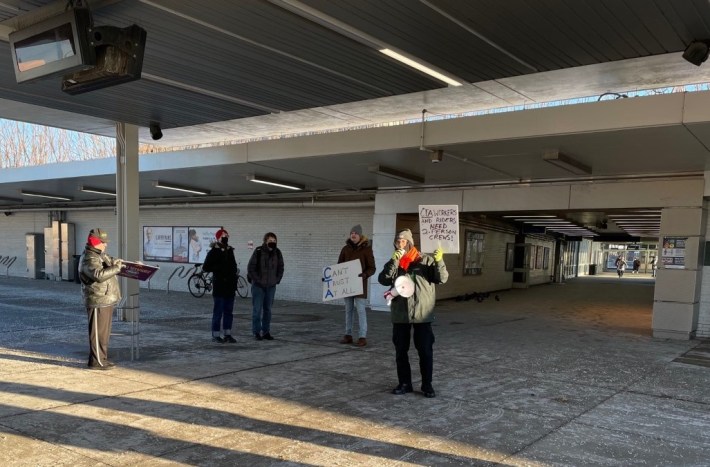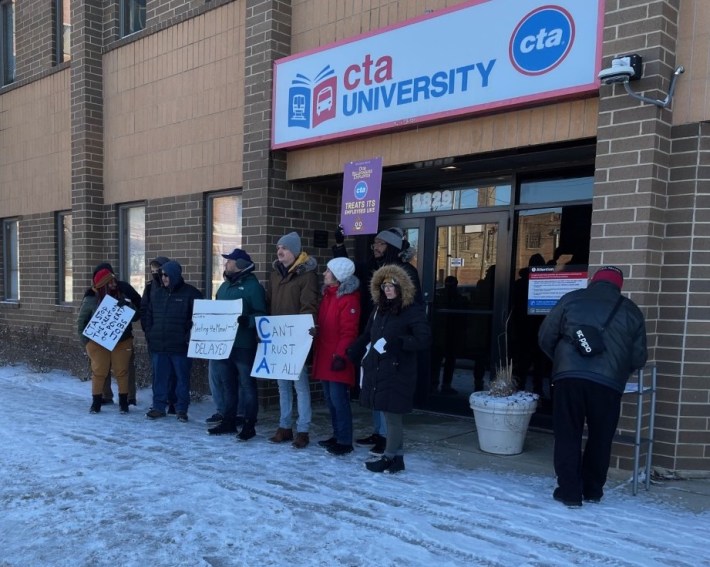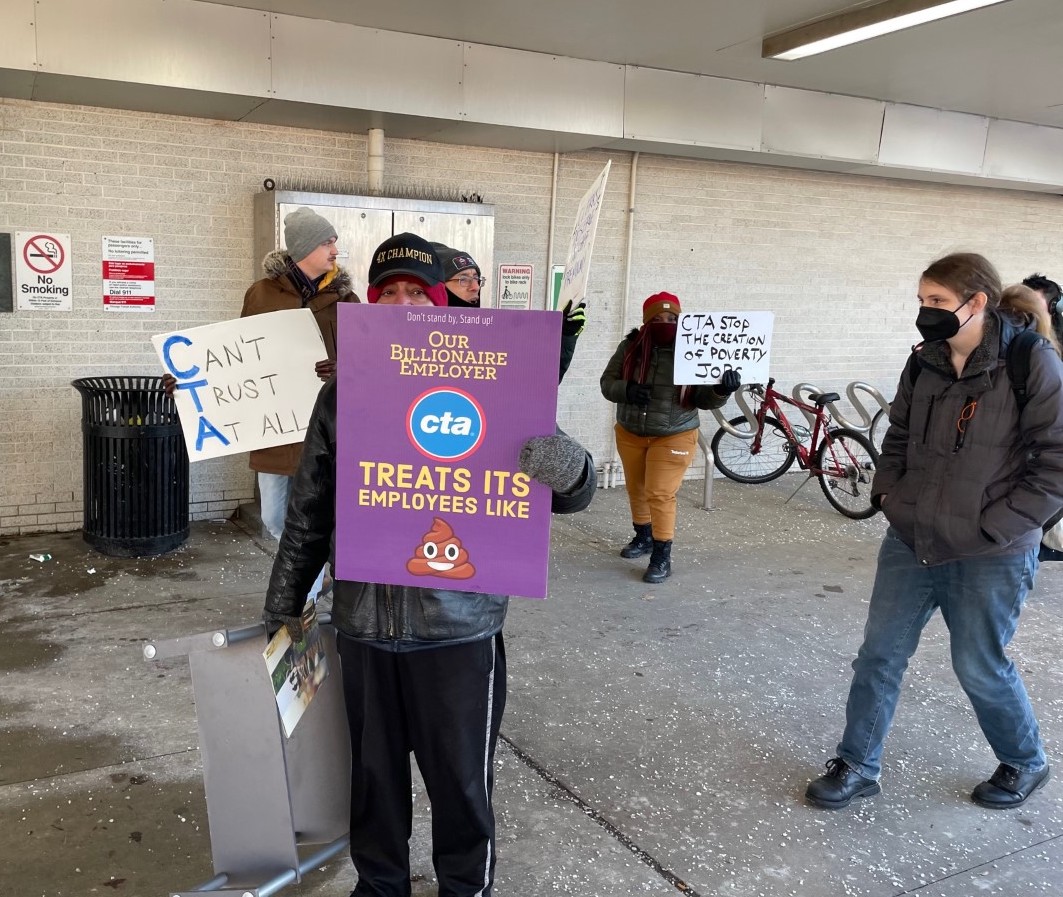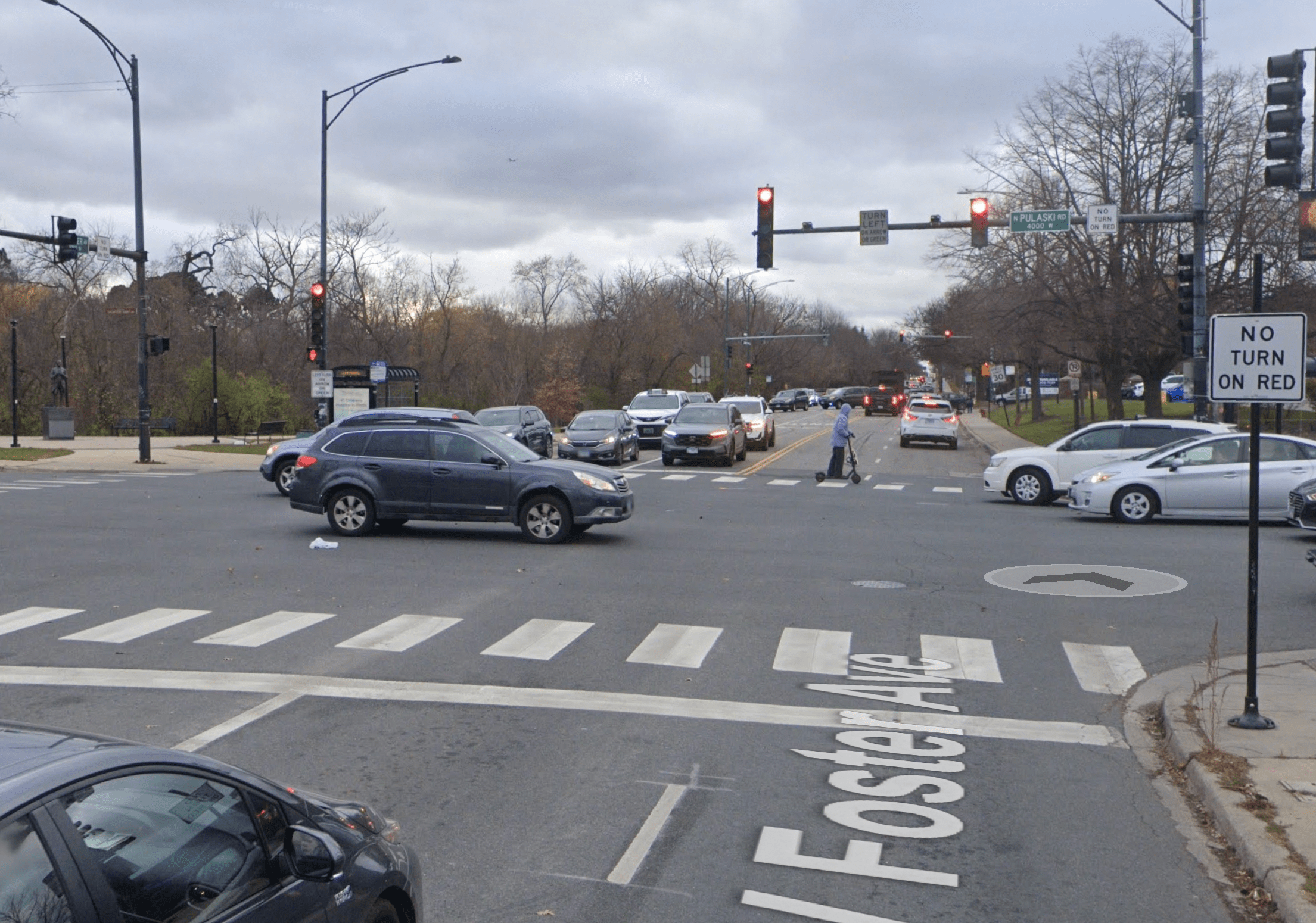According to its website, the Chicago Transit Justice Coalition is an organization that "empowers [Amalgamated Transit Union] Local 241 and Local 308 members with tools to take control of their unions and to inspire humble, accountable leadership," but is independent of the union. Members are critical of both the CTA management and the union leadership.
The coalition held a protest earlier this month at the Jefferson Park Transit Center calling for better conditions for transit workers, as the CTA struggles with with reliability and safety issues caused by staffing shortages.
"[The coalition] started when I made a proposal to change the bylaws of our union, local ATU, so that part-time workers would have a discount on dues, and the union leadership got really scared and upset because that dries up their money," cofounder Eric M. Basir told Streetsblog at the demonstration. "And so they made big posters about union busting."
Basir said he satirized the situation on social media, and then decided to create a transit workers organization separate from the union. He also serves as a union steward, assisting workers who have questions or problems with CTA management, and said he's thinking about running for union president. "Some managers that do a fine job. A few... a lot of their role is to save money. And to do that, they have to fire people or lay people off that have lots of seniority because they cost a lot of money. Then replace those jobs with part-time jobs that don't cost a lot of money."
The coalition's website outlines the group's goals:
- Establish and maintain a platform of solutions to fundamental issues that current and potential candidates can adopt.
- Spearhead public and on-the-job actions to augment contract negotiations and boost worker morale and unity. Empower members to overcome unfair punishment and unjustified firings at work.
- Ensure that all impediments to member participation in union activities and duties are eliminated or minimized.
- Establish and maintain positive and mutually beneficial connections between the passengers and the workers.
- Ensure that elected leaders continue to build on strengths and improve where they are weak.
- Be a source of constructive criticism for ATU Local 241 and 308 that is free of slander of individuals or cause damage to the union.
- Encourage solidarity with similar groups and unions outside of ATU Locals 241 and 308.
- Encourage discussion that will lead to a merger of ATU Local 241 and 308 into a single Local Union.
About a dozen people attended the rally at the transit center during the morning rush, which Basir organized with CTA customer service rep Kaled Abdelal, and Fabio Göttlicher, cofounder of the grassroots advocacy group Commuters Take Action. Protesters passed out fliers to commuters, and held signs reading "Can't Trust Anyone," "Meeting the Moment – Delayed," "CTA Workers and Riders Need 2-Person Crews," and "CTA Stop the Creation of Poverty Jobs."
The current starting wage for full-time bus and train operators is about $29 an hour. However, new employees have to work relatively low-paying jobs in customer service or as flaggers before getting promoted to drivers.

“Your Blue Line used to come every three minutes during rush hour, but now, we are lucky if we get the train every 10 or 15 minutes," said Göttlicher at the protest. "And why is that? The CTA doesn’t treat their workers right. Throughout COVID they were mistreated and many of them have left. They said they are trying to train new ones, but the attrition is still terrible."
"We are now in the middle of rush hour," Göttlicher added. "There should be buses at every stand right here, but I see many empty stalls because there are not enough operators to run these buses to get people where they need to get during rush hour on this very cold day."
“We need to organize strikes," said Kathryn Strzelecki, a retired switcher. "We need to organize walk outs. We need to get out on the streets and take a stand because that's the only thing the ruling class listens to.... We do all the work and they get all the money.”

At 8 a.m. the group marched about a block from the transit center to the CTA University training facility. There the demonstrators chanted for the late CTA rail instructor Mohammad Farouki's shield number to be retired as a tribute. According to Basir, Farouki successfully sued the CTA for discrimination but passed away shortly afterward. Basir said he and Abdelal would also be filing grievances for discrimination, alleging they had been denied instructor positions despite their qualifications because of their organizing work.
While the protest was lightly attended (the early start time and frigid weather probably didn't help), Basir said the coalition plans to do more outreach to transit employees for a future demonstration. He said he hopes to get "more co-workers in the fray to stand up."
Chicago Transit Justice Coalition meetings take place the second Tuesday of every month.

Did you appreciate this article? Please consider making a tax-deductible donation to help fund Streetsblog Chicago's next year of publication. Thanks!




